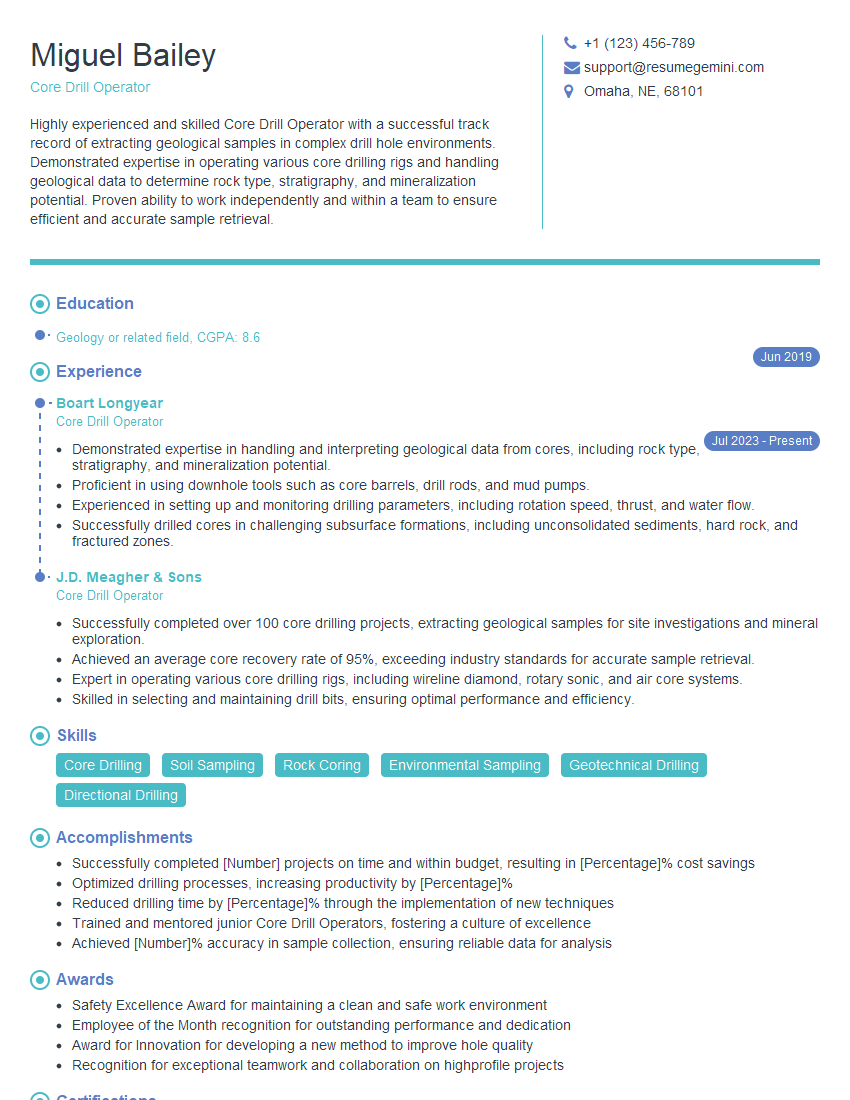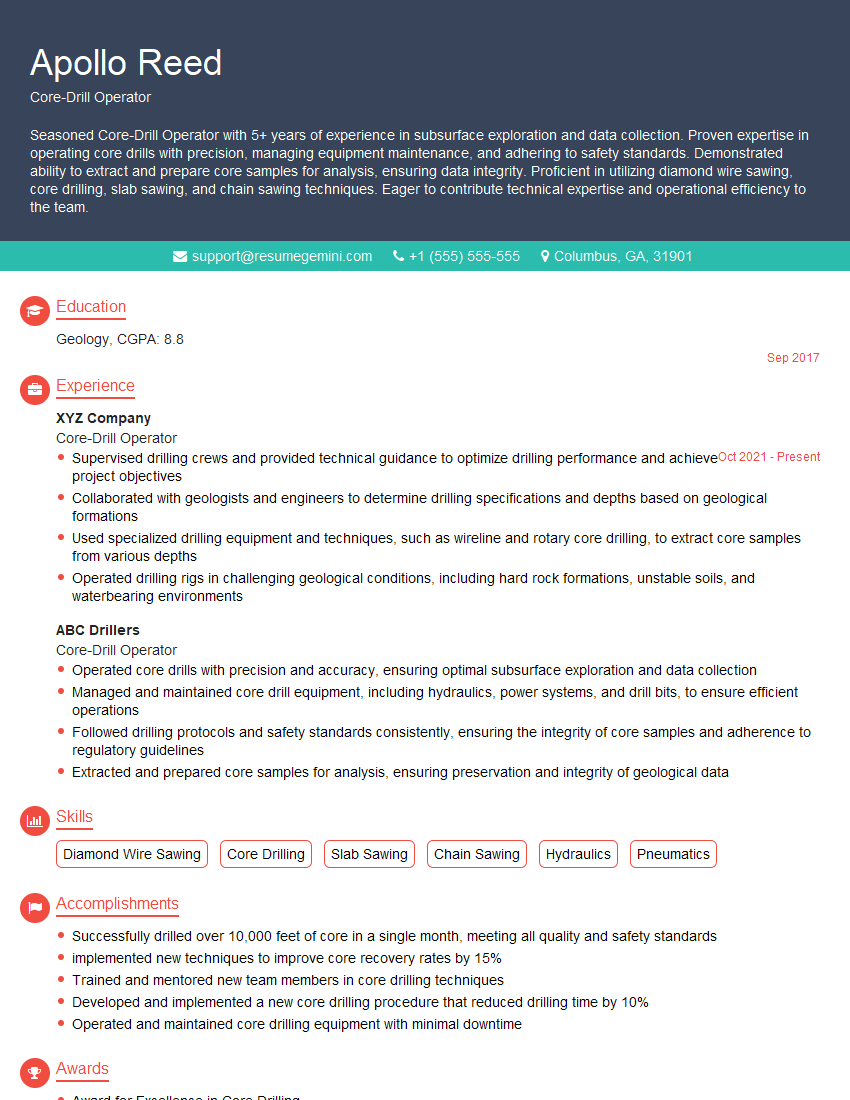Are you gearing up for a career in Core Drill Operator? Feeling nervous about the interview questions that might come your way? Don’t worry, you’re in the right place. In this blog post, we’ll dive deep into the most common interview questions for Core Drill Operator and provide you with expert-backed answers. We’ll also explore the key responsibilities of this role so you can tailor your responses to showcase your perfect fit.
Acing the interview is crucial, but landing one requires a compelling resume that gets you noticed. Crafting a professional document that highlights your skills and experience is the first step toward interview success. ResumeGemini can help you build a standout resume that gets you called in for that dream job.
Essential Interview Questions For Core Drill Operator
1. How do you determine if the rock being drilled is competent or not?
To determine if the rock being drilled is competent or not, I consider the following factors:
- Visual Inspection: I examine the rock’s texture, grain size, and any visible cracks or fractures.
- Drilling Speed: I observe the drilling rate and note any changes or difficulties in penetrating the rock.
- Drill Bit Condition: I check the condition of the drill bit for signs of wear or damage, which may indicate hard or abrasive rock.
- Drilling Fluid: I monitor the flow and appearance of the drilling fluid to detect any changes in viscosity or the presence of rock particles, which may indicate incompetent rock.
- Geological Knowledge: I consult geological maps and reports to gain insights into the expected rock formation and its potential competency.
2. What types of core drilling techniques are you familiar with?
Rotary Core Drilling
- Used in most common geological formations.
- Involves rotating a hollow cylindrical drill bit to cut into the rock.
Percussion Core Drilling
- Used in hard or fractured rock formations.
- Employs a hammer and chisel action to break the rock.
Sonic Core Drilling
- Used in soft or unconsolidated formations.
- Vibrates the drill bit at high frequencies to liquefy the soil.
3. How do you handle potential safety hazards associated with core drilling?
To ensure safety during core drilling, I adhere to established protocols and follow these steps:
- Proper PPE: I wear appropriate personal protective equipment, including safety glasses, gloves, and hearing protection.
- Equipment Inspection: I inspect the drilling rig and equipment thoroughly before use to ensure they are in good working condition.
- Site Assessment: I conduct a thorough site assessment to identify potential hazards, such as overhead lines, water bodies, or unstable ground.
- Proper Rigging: I properly rig the drilling equipment to prevent uncontrolled movement or collapse.
- Emergency Preparedness: I am trained in emergency procedures and have access to first aid kits and communication devices.
4. What are your key responsibilities as a Core Drill Operator?
- Prepare and operate core drilling equipment to extract rock core samples.
- Monitor drilling progress, change drill bits, and adjust drilling parameters as needed.
- Maintain drilling equipment and keep a clean and organized work area.
- Follow safety protocols and adhere to industry regulations.
- Record drilling data, prepare core logs, and provide technical assistance as required.
5. How do you troubleshoot common problems encountered during core drilling?
To troubleshoot common problems during core drilling, I follow a systematic approach:
- Slow Drilling: Check bit wear, rock hardness, drilling fluid flow, and equipment alignment.
- Poor Core Recovery: Examine bit type, drilling speed, core barrel condition, and rock formation characteristics.
- Stuck Pipe: Determine if the pipe is wedged in the hole, adjust drilling parameters, or consider using a releasing agent.
- Vibrations: Inspect the equipment for imbalances, check bit condition, and adjust drilling speed or weight on bit.
- Hydraulic Leaks: Identify the source of the leak, tighten connections, or replace seals as necessary.
6. What is the importance of maintaining accurate core logs?
Maintaining accurate core logs is crucial for several reasons:
- Geological Record: Core logs provide a detailed record of the subsurface geology, including rock types, structures, and mineralization.
- Exploration and Resource Evaluation: They help geologists and engineers evaluate mineral deposits, hydrocarbon reservoirs, and groundwater resources.
- Geotechnical Assessment: Core logs assist in determining the engineering properties of rock formations for construction and infrastructure projects.
- Environmental Studies: They provide information for environmental impact assessments and groundwater contamination studies.
- Historical Reference: Core logs serve as a valuable archive of geological information for future reference and research.
7. How do you ensure the quality of core samples you obtain?
- Proper Drilling Techniques: I adhere to recommended drilling parameters and core handling procedures to minimize sample disturbance.
- Bit Selection: I select the appropriate drill bit type and size based on the rock formation and desired core diameter.
- Core Handling: I carefully extract the core samples from the core barrel and store them in labeled core boxes to prevent damage or contamination.
- Documentation: I maintain accurate core logs and include information on drilling parameters, sample depth, and any observations.
- Collaboration with Geologists: I consult with geologists to determine the desired sample quality for specific analytical purposes.
8. What types of drilling fluid do you use and how do you select the appropriate one?
The type of drilling fluid I choose primarily depends on the drilling conditions and the desired results:
- Water-Based Fluids: Ideal for soft to medium-hard formations, easy to circulate, and provide good cooling.
- Oil-Based Fluids: Used in hard and abrasive formations, reduce friction and tool wear, but require special handling and disposal.
- Air: Used in dry or semi-dry conditions, provides high penetration rates, but may limit sample quality.
- Mud: Composed of water, bentonite, and other additives, helps stabilize the borehole, reduce friction, and enhance sample recovery.
- Foam: A mixture of air and water or surfactant, creates a stable foam that provides lift and reduces fluid loss.
9. What is the difference between diamond coring and reverse circulation coring?
- Diamond Coring:
- Uses a diamond-studded drill bit to cut through rock.
- Produces a solid core sample that preserves the rock’s original structure.
- Suitable for hard and abrasive formations.
- Reverse Circulation Coring:
- Uses a rotating bit with water or air as the circulating fluid.
- Produces a crushed or pulverized core sample.
- Faster and less expensive than diamond coring, but provides less detailed geological information.
10. How do you estimate the cost and duration of a core drilling project?
To estimate the cost and duration of a core drilling project, I consider several factors:
- Project Scope: Depth of drilling, number of holes, and core diameter.
- Rock Formation: Hardness, abrasiveness, and presence of water or gas.
- Equipment and Labor: Type and availability of drilling rig, labor rates.
- Logistics: Transportation of equipment and materials to the site.
- Permits and Safety: Required permits and adherence to safety regulations.
Interviewers often ask about specific skills and experiences. With ResumeGemini‘s customizable templates, you can tailor your resume to showcase the skills most relevant to the position, making a powerful first impression. Also check out Resume Template specially tailored for Core Drill Operator.
Career Expert Tips:
- Ace those interviews! Prepare effectively by reviewing the Top 50 Most Common Interview Questions on ResumeGemini.
- Navigate your job search with confidence! Explore a wide range of Career Tips on ResumeGemini. Learn about common challenges and recommendations to overcome them.
- Craft the perfect resume! Master the Art of Resume Writing with ResumeGemini’s guide. Showcase your unique qualifications and achievements effectively.
- Great Savings With New Year Deals and Discounts! In 2025, boost your job search and build your dream resume with ResumeGemini’s ATS optimized templates.
Researching the company and tailoring your answers is essential. Once you have a clear understanding of the Core Drill Operator‘s requirements, you can use ResumeGemini to adjust your resume to perfectly match the job description.
Key Job Responsibilities
A Core Drill Operator is responsible for operating and maintaining core drilling equipment to extract rock samples for geological or construction purposes. Their primary duties involve:
1. Drilling Operations
Setting up and operating core drilling equipment
- Determining drilling depths and angles
- Drilling boreholes and extracting rock cores
2. Equipment Maintenance
Maintaining and repairing drilling equipment
- Replacing drill bits, rods, and other components
- Lubricating and cleaning equipment
3. Sample Handling
Handling and storing rock cores
- Logging and labeling core samples
- Preparing samples for analysis
4. Safety and Compliance
Following safety regulations and protocols
- Wearing appropriate protective gear
- Ensuring compliance with environmental regulations
Interview Tips
To ace your interview for a Core Drill Operator position, follow these tips:
1. Research the Company and the Role
Before the interview, thoroughly research the company and the specific role you’re applying for. Familiarize yourself with their industry, services, and the project you’ll potentially be working on.
- Visit the company website and social media pages.
- Look up company news and industry articles.
2. Highlight Relevant Skills and Experience
Emphasize your core drilling skills, such as operating various types of drilling equipment, maintaining and repairing machinery, and handling rock core samples. Showcase your previous experience in similar roles.
- Quantify your accomplishments with specific metrics.
- Be prepared to provide examples of your problem-solving and troubleshooting abilities.
3. Showcase Safety Consciousness
Safety is paramount in the core drilling industry. Highlight your commitment to following safety regulations, wearing appropriate protective gear, and maintaining a safe work environment.
- Mention any safety certifications or training you have.
- Describe best practices you follow to prevent accidents.
4. Prepare for Technical Questions
Be ready to answer technical questions about core drilling equipment, drilling techniques, and geological formations. Practice explaining the different types of core bits, the factors that affect drilling depth, and how to interpret core samples.
- Review industry-specific terminology and concepts.
- Bring a portfolio or examples of your previous work if possible.
5. Ask Thoughtful Questions
At the end of the interview, ask thoughtful questions to demonstrate your interest and understanding of the role. This could include inquiries about the company’s project pipeline, the team you’d be working with, or the opportunities for professional development.
- Avoid asking generic or self-serving questions.
- Show that you’re genuinely interested in the company and the position.
Next Step:
Now that you’re armed with a solid understanding of what it takes to succeed as a Core Drill Operator, it’s time to turn that knowledge into action. Take a moment to revisit your resume, ensuring it highlights your relevant skills and experiences. Tailor it to reflect the insights you’ve gained from this blog and make it shine with your unique qualifications. Don’t wait for opportunities to come to you—start applying for Core Drill Operator positions today and take the first step towards your next career milestone. Your dream job is within reach, and with a polished resume and targeted applications, you’ll be well on your way to achieving your career goals! Build your resume now with ResumeGemini.

